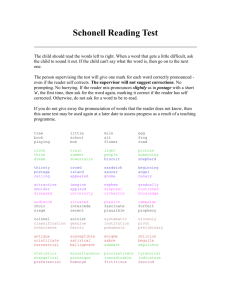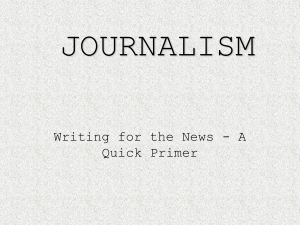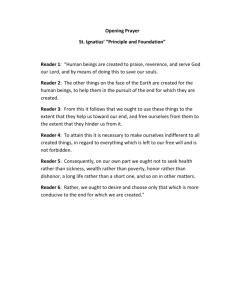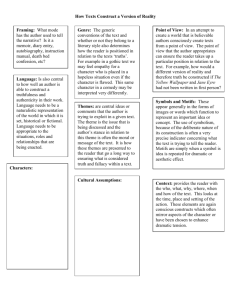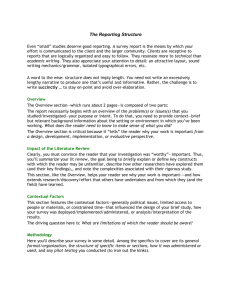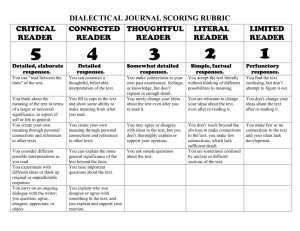Theorizing History in Genderqueer San Francisco - Trans
advertisement
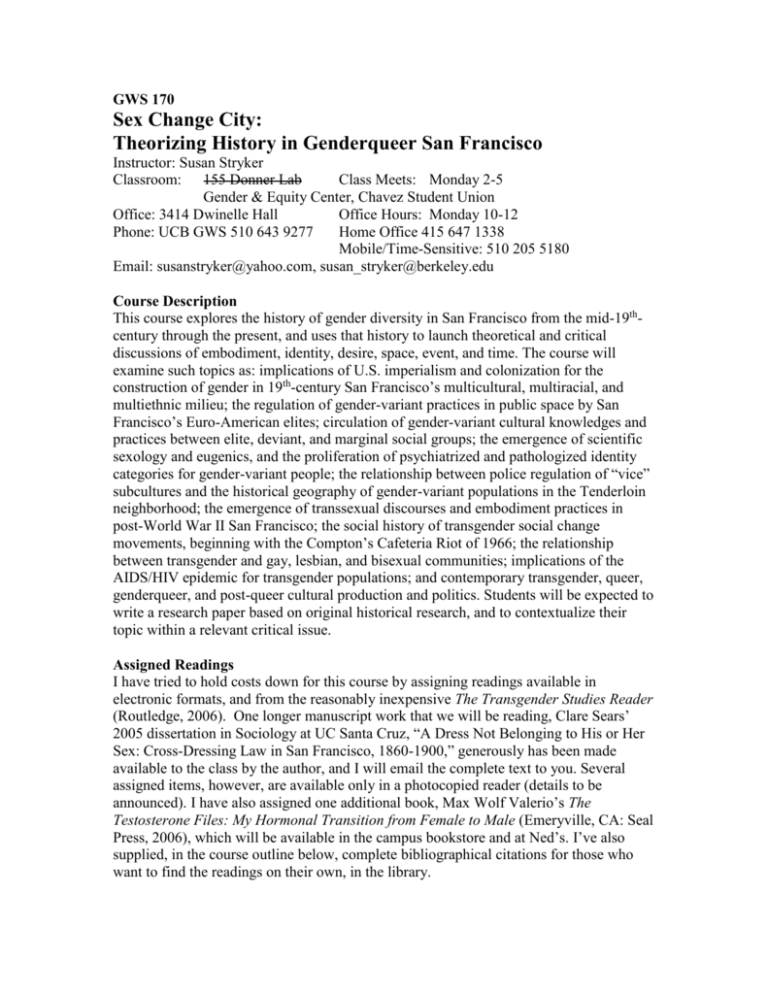
GWS 170 Sex Change City: Theorizing History in Genderqueer San Francisco Instructor: Susan Stryker Classroom: 155 Donner Lab Class Meets: Monday 2-5 Gender & Equity Center, Chavez Student Union Office: 3414 Dwinelle Hall Office Hours: Monday 10-12 Phone: UCB GWS 510 643 9277 Home Office 415 647 1338 Mobile/Time-Sensitive: 510 205 5180 Email: susanstryker@yahoo.com, susan_stryker@berkeley.edu Course Description This course explores the history of gender diversity in San Francisco from the mid-19thcentury through the present, and uses that history to launch theoretical and critical discussions of embodiment, identity, desire, space, event, and time. The course will examine such topics as: implications of U.S. imperialism and colonization for the construction of gender in 19th-century San Francisco’s multicultural, multiracial, and multiethnic milieu; the regulation of gender-variant practices in public space by San Francisco’s Euro-American elites; circulation of gender-variant cultural knowledges and practices between elite, deviant, and marginal social groups; the emergence of scientific sexology and eugenics, and the proliferation of psychiatrized and pathologized identity categories for gender-variant people; the relationship between police regulation of “vice” subcultures and the historical geography of gender-variant populations in the Tenderloin neighborhood; the emergence of transsexual discourses and embodiment practices in post-World War II San Francisco; the social history of transgender social change movements, beginning with the Compton’s Cafeteria Riot of 1966; the relationship between transgender and gay, lesbian, and bisexual communities; implications of the AIDS/HIV epidemic for transgender populations; and contemporary transgender, queer, genderqueer, and post-queer cultural production and politics. Students will be expected to write a research paper based on original historical research, and to contextualize their topic within a relevant critical issue. Assigned Readings I have tried to hold costs down for this course by assigning readings available in electronic formats, and from the reasonably inexpensive The Transgender Studies Reader (Routledge, 2006). One longer manuscript work that we will be reading, Clare Sears’ 2005 dissertation in Sociology at UC Santa Cruz, “A Dress Not Belonging to His or Her Sex: Cross-Dressing Law in San Francisco, 1860-1900,” generously has been made available to the class by the author, and I will email the complete text to you. Several assigned items, however, are available only in a photocopied reader (details to be announced). I have also assigned one additional book, Max Wolf Valerio’s The Testosterone Files: My Hormonal Transition from Female to Male (Emeryville, CA: Seal Press, 2006), which will be available in the campus bookstore and at Ned’s. I’ve also supplied, in the course outline below, complete bibliographical citations for those who want to find the readings on their own, in the library. Texts Course Reader (photocopy) Course Reader Supplement (photocopy) Electronic Documents (On Disk/Email/Library) Stryker and Whittle, eds, Transgender Studies Reader (optional, but a good idea) Max Valerio, The Testosterone Files San Francisco History Background The course assumes basic familiarity with San Francisco’s history since the mid-19th century. If you need to, please supplement the assigned readings with any of many available general histories of San Francisco. Course Format Because class meets Monday afternoon for three long hours, we’ll take a 10 to 15 minute break halfway through, and try to keep things as varied and lively as possible. Each class will begin with a period for announcements and for sharing news related to course content. I’ll then offer a brief lecture if I feel anything needs additional coverage, followed by discussion of the week’s assigned reading—usually one or two major topics. Sometimes there will be films, music, or guest speakers. Grading and Assignments Attendance and discussion: 30% Attendance is required. Students are expected to contribute regularly to discussions in the classroom and/or come for office visits, and/or communicate with me by email. Presentations: 25% Students are expected to do three presentations over the course of the semester. On February 12, you’ll make a short (2-3 minute) preliminary presentation to the class about your proposed research topic, worth 5% of your total course grade. On May 7, the last day of class, you’ll make a longer presentation (about 10 minutes) on your research paper, worth 10% of your total course grade. Sometime during the course of the semester, you’ll be expected to lead class discussion on one of the assigned readings of your own choosing, for no more than about 10 minutes. This will be worth 15% of your total course grade. You can start signing up for the discussions you’d like to lead at any time. Short Writing Assignments 15% Assignment #1: Because this course emphasizes “embodied knowledges” and methodologies that involving situating the researcher in the work of researching and theorizing, you will need to write a short (2-5page) paper telling me something about yourself, why you are interested in this class, what your relationship is to the topics we will be studying, how your own embodiment informs how your know, what you’d like to do with what you learn here, etc. This paper can be entirely descriptive rather than analytical. It will be ungraded, but worth 5% of your course grade. It will be due January 29 (second class meeting). Assignments #2 and #3: You will need to write 3-5-page response papers for two of the assigned readings, of your own choosing. One of these may be the same article for which you lead the classroom discussion. The ideal response paper would include background information on the author and her/his work (which might require you to do a little extra digging around on the internet or library), a summary of the main ideas in the piece you are responding to, and a discussion of your substantive reactions to the piece, either emotional or intellectual or both. Each paper will be work 5% of your grade, and can be turned in at any point in the semester up to and including May 7, the last day of class. Major Research Paper: 30% The major assignment for class is an original research paper of 20 pages (excluding notes and bibliographies). The paper can be on any aspect of San Francisco Bay Area trans/genderqueer history or contemporary trans-/genderqueer communities. Students are especially encouraged to write papers on topics not covered in class, of which there are many. The paper should use some body of empirical/ historical material, and it should use that material to then launch a more theoretical/critical discussion of the issues raised by the documentary research. Ideally, you should relate your research topic to some of the reading we have done in class. It’s OK to coordinate your class presentations and short writing assignments with your major research paper. The paper needs to analytical rather than merely descriptive, and should be based upon your own work; plagiarism will, at minimum, result in a complete loss of credit for this assignment. I will be happy to suggest a topic to you if you unfamiliar with this subject area and need assistance. You may well need to conduct research not only at UC Libraries, but also at the San Francisco or Oakland Public Libraries, the California Historical Society, the archives of the GLBT Historical Society, or other research libraries. Please discuss your research interests with me as early in the semester as possible, so that I can help direct you toward the best sources. With prior permission, you can do a service-based learning project instead of a research paper. This would require 20 hours of service with an organization serving the transgender community, conducting a clearly defined project. You would still need to write up a description of your project, what you learned, and how it was related to the topic and themes of the course. The final draft of your research paper is due May 18. I am willing to read rough drafts and return them with comments through May 14. Because I am a lecturer hired for one semester only, I am especially loathe to give extensions and incompletes. Let’s all be done with this course in May, and move on with our lives. Syllabus Week of January 15 Classes Begin on Tuesday, so our class does not meet this week Week of January 22 Topics Course Introduction and Overview Methodology and Theory: Embodiment, Knowledge, History (intro lecture) Readings: Antoinette Burton, “Introduction: Archive Fever, Archive Stories,” in Antoinette Burton, ed.; Archive Stories: Facts, Fictions, and the Writing of History (Durham, NC: Duke University Press, 2005), 1-24. [Reader] Pierre Bourdieu, “Structures and the Habitus” in Outline of a Theory of Practice, (Cambridge: Cambridge University Press, 1977) 72-95. [Reader] Week of January 29 Topics Methodology and Theory: Embodiment, Knowledge, History (read/discuss) Native Genders Readings [Burton and Bourdieu, assigned last week.] Sabine Lang, “There is More Than Just Men and Women: Gender Variance in North American Indian Culture,” in Sabrina Rahmet, ed., Gender Reversals and Gender Cultures: Anthropological and Historical Perspectives (New York: Routledge, 1996), 183-196. [Reader] Albert L. Hurtado, “When Strangers Met: Sex and Gender on Three Frontiers,” Frontiers: A Journal of Women’s Studies 17:3 (1996), 52-75. [E-format] Leslie Feinberg, “Transgender Liberation, A Movement Whose Time Has Come,” in Susan Stryker and Stephen Whittle, eds., The Transgender Studies Reader (New York: Routledge, 2006), 205-220. Evan Towle and Lynn Morgan, “Romancing the Transgender Native: Rethinking the Use of the ‘Third Gender’ Concept,” in Susan Stryker and Stephen Whittle, eds., The Transgender Studies Reader (New York: Routledge, 2006), 666-684. Assignment Due First writing assignment due—3-5 page personal statement. Week of February 5 Topics Decolonizing Western Historiography Queering the Gold Rush Readings Emma Perez, “Sexing the Colonial Imaginary: (En)gendering Chicano History, Theory, and Consciousness” in The Decolonial Imaginary: Writing Chicanas Into History (Bloomington, IN: Indiana University Press, 1999), 3-30. [E-format] Albert L. Hurtado, “Sex, Gender, Culture, and a Great Event: The California Gold Rush,” Pacific Historical Review 68:1 (Feb 1999), 1-19. [E-format] William Lipsky, “A City of Men,” in Gay and Lesbian San Francisco (San Francisco: Arcadia Press, 2006), 10-22. (Note: this is almost entirely photos/images). [Reader] Clare Sears, “A Dress Not Belonging to His or Her Sex: Cross-Dressing Law in San Francisco, 1860-1900,” Ph.D. Dissertation, Sociology Department, UC Santa Cruz, 2005, iv-108. [Emailed] Week of February 12 Topics Regulating Gender in Public Space Student Presentations on Research Interest Readings Clare Sears, “A Dress Not Belonging to His or Her Sex: Cross-Dressing Law in San Francisco, 1860-1900,” Ph.D. Dissertation, Sociology Department, UC Santa Cruz, 2005, 109-242. [Emailed] Week of February 19 Holiday: No Class Meeting However, please do the readings, which we will discuss next week Topic Theatricalizing Gender in Bohemian San Francisco Reading Nan Alamilla Boyd, “Transgender and Gay Male Culture in San Francisco From the 1890s Through the 1960s,” in Wide Open Town: A History of Queer San Francisco to 1965 (Berkeley: University of California Press, 2003), 25-62. [Reader Supplement] William Lipsky, “Bohemia By the Bay,” in Gay and Lesbian San Francisco (San Francisco: Arcadia Press, 2006), 23-48. (Note: this is almost entirely photos/images). [Reader] Laurence Senelick, “Putting on the Drag” and “Imp(Ersonator) of the Perverse,” in The Changing Room: Sex, Drag, and Theater (New York: Routledge, 2000), 295-350. [Reader] Fabio Cleto, “Introduction: Queering the Camp,” in Fabio Cleto, Camp: Queer Aesthetics and the Performing Subject (Ann Arbor, MI: University of Michigan Press, 1999), 1-43. [Reader Supplement] Week of February 26 Topic Nation, Race, Empire, Science, and Sex, Part I Presentation Cross-Dressing at the Bohemian Club of San Francisco, 1880s-1920s Readings Ann Laura Stoller, “Tense and Tender Ties: The Politics of Comparison in North American History and (Post)Colonial Studies,” in Ann Laura Stoller, ed. Haunted by Empire: Geographies of Intimacy in North American History (Chapel Hill, NC: Duke University Press, 2006), 23-70. [Reader Supplement] Siobhan Somerville, “Introduction” and “Scientific Racism and the Invention of the Homosexual Body,” in Queering the Color Line: Race and the Invention of Homosexuality in American Culture (Durham, NC: Duke University Press, 2000), 1-38. [Reader, Questia] Alexandra Minna Stern, “California’s Eugenic Landscapes,” in Eugenic Nation: Faults and Frontiers of Better Breeding in Modern America (Berkeley: University of California Press, 2005), 115-149. [Reader Supplement] Amy Sueyoshi, “Mindful Masquerades: Que(e)rying Japanese Immigrant Dress in Turnof-the-Century San Francisco,” Frontiers: A Journal of Women’s Studies 26:3 (2005), 67-100. [Online] Week of March 5 Topics: Nation, Race, Empire, Science, and Sex, Part II Habitus and Performativity Theory Readings Magnus Hirschfeld, selections from The Transvestites: The Erotic Drive for Disguise, in Susan Stryker and Stephen Whittle, eds., The Transgender Studies Reader (New York: Routledge, 2006), 28-39. Magnus Hirschfeld, “Case 13,” The Transvestites: The Erotic Drive for Disguise, (Buffalo, NY: Prometheus Books, 1991 [orig. pub. 1910], 83-93. [Reader] Judith Butler, “Performativity’s Social Magic,” in Richard Shusterman, ed. Bourdieu: A Critical Reader (Oxford: Blackwell, 1999), 113-128. [Reader] Week of March 12 Topics History of The Tenderloin Spatial Generativity Readings Neil L. Shumsky and Larry M. Springer, “San Francisco’s Zone of Prostitution, 18801934,” Journal of Historical Geography, 7:1 (1981) 71-89. [Online] Clark Taylor, et. al. “The Tenderloin’s Past,” in Final Report: The Tenderloin Ethnographic Research Project (San Francisco: Hospitality House, 1977), 1-50. [Reader] Giorgio Agamben, “The Camp as ‘Nomos’ of the Modern,” in Homo Sacer: Sovereign Power and Bare Life (Stanford, CA: Stanford University Press, 1998), 166-180. [Reader] Zoë Sophia, “Container Technologies,” Hypatia: A Journal of Feminist Philosophy 15:2 (2000), 181-219. [Online] Elizabeth Grosz, “Futures, Cities, Architectures,” in Architecture from the Outside: Essays on Virtual and Real Space,”49-57. [Reader] Judith Halberstam, “Queer Temporality and Postmodern Geographies,” in In a Queer Time and Place: Transgender Bodies, Subcultural Lives (Durham, NC: Duke University Press, 2005), 1-21. [Reader] Week of March 19 Class Visit: Clare Sears, Women’s Studies, University of California, Irvine Topic Transsexuality and Postmodernity After WWII Reading Joanne Meyerowitz, “A ‘Fierce and Demanding’ Drive’,” in Susan Stryker and Stephen Whittle, eds., The Transgender Studies Reader (New York: Routledge, 2006), 362-386. Louise Lawrence, Journal, 1943-44, Transcription, [Original in Louise Lawrence Collection, Kinsey Institute, Indiana University, Bloomington.] [Reader Supplement] Karl Bowman, “Introduction” and “The Problem of the Sex Offender,” in California Sex Deviates Research Act, Progress Report, 1951. 1-25. Typescript, Don Lucas Collection, GLBT Historical Society. [Reader] Harry Benjamin, The Transsexual Phenomenon (New York: Julian Press, 1966). Entire Text available as free download at http://www.symposion.com/ijt/benjamin/index.htm. [Okay to just skim.] [Online] Susan Stryker, “Christine Jorgensen’s Atom Bomb: Transsexuality and the Emergence of Postmodernity,” in E. Anne Kaplan and Susan Squier, eds., Playing Dolly: Technocultural Formations, Fantasies, and Fictions of Assisted Reproduction (New Brunswick, NJ: Rutgers University Press, 1999), 157-171. [Reader] Week of March 26 Spring Break, no class Week of April 2 Topic Transgender Liberation and Social Change in the 1960s Film Screaming Queens: The Riot at Compton’s Cafeteria Reading Mack Freidman, “City Slickers: Metropolitan Hustlers, 1950-1970,” in Strapped for Cash: A History of American Hustler Culture (Los Angeles: Alyson, 2003) 111-150, 273. [Reader] Elizabeth Armstrong and Suzanna Crage, “Movements and Memory: The Making of the Stonewall Myth,” American Sociological Review 71:5 (2006), 724-751. [Online] Transgender Liberation Movement and Community Organizing: Primary Documents [Reader Supplement] Pam Tent, Midnight at the Palace: My Life as a Fabulous Cockette (Los Angeles: Alyson, 2004), 27-42, 57-74. [Reader] Week of April 9 Topic LGBT and Feminist Community Politics Readings Joshua Gamson, The Fabulous Sylvester: The Legend, the Music, the Seventies in San Francisco (New York: Picador, 2006), 41-133. [OK to skim] [Reader] Horacio Roque Ramirez, “A Living Archive of Desire: Teresita La Campesina and the Embodiment of Queer Latino Community Histories,” in Antoinette Burton, ed., Archive Stories: Facts, Fictions, and the Writing of History (Durham, NC: Duke University Press, 2005,) 111-135. [Reader Supplement] Janice Raymond, “Sappho By Surgery: The Transsexually Constructed LesbianFeminist,” in Susan Stryker and Stephen Whittle, eds., The Transgender Studies Reader (New York: Routledge, 2006), 131-143. Nan Alamilla Boyd, “Bodies in Motion: Lesbian and Transsexual Histories,” in Susan Stryker and Stephen Whittle, eds., The Transgender Studies Reader (New York: Routledge, 2006), 420-433. Week of April 16 Topic FTM Community Formation Readings Susan Stryker, “Portrait of a Trans Fag Drag Hag as a Young Man: The Activist Career of Lou Sullivan,” in Kate More and Stephen Whittle, eds., Reclaiming Gender: Transsexual Grammars at the Fin de Siecle (London: Cassells, 1999), 62-82. [Reader] Henry Rubin “Border Wars: Lesbian and Transsexual Identities,” in Self-Made Men: Identity and Embodiment among Transsexual Men (Nashville, TN: Vanderbilt University Press, 2003), 77-92. [Reader] Gayle Rubin, “Catamites and Kings: Reflections on Butch, Gender, and Boundaries,” in Susan Stryker and Stephen Whittle, eds., The Transgender Studies Reader (New York: Routledge, 2006), 471-48. Week of April 23 Topics GID and HIV Guest Lecturer: Chris Roebuck, UC Berkeley Department of Anthropology Reading Janice Irvine, “Boys Will Be Girls,” in Disorders of Desire: Sex and Gender in Modern American Sexology,”(Philadelphia: Temple University Press, 1990), 229-278. [Reader] World Professional Organization for Transgender Health (formerly Harry Benjamin International Gender Dysphoria Association,” Standards of Care (6th Revised Edition, 2001), http://www.wpath.org/soc.htm [Online] Kristen Clements-Nolle, Rani Marx, Robert Guzman and Mitchell Katz, “HIV prevalence, risk behaviors, health care use, and mental health status of transgender persons: implications for public health intervention,” American Journal of Public Health, 91:6 (2001), 915-921. [E-format] Kristen Clements, Willy Wilkinson, Kerrily Kitano Ph.D., and Rani Marx, Ph.D. “HIV Prevention and Health Service Needs of the Transgender Community in San Francisco,” International Journal of Transgenderism 3: 1/2 (1999). http://www.symposion.com/ijt/hiv_risk/clements.htm. [Online] Willy Wilkinson, “Public Health Gains of the Transgender Community in San Francisco: Grass-roots Organizing and Community-Based Research,” in Paisley Currah, Richard M. Juang, and Shannon Price Minter, eds., Transgender Rights (Minneapolis: University of Minnesota Press, 2006), 192-214. [Reader] Week of April 30 Topic Queering Gender since the 1990s Reading Max Wolf Valerio, The Testosterone Files (Emeryville, CA: Seal Press, 2005), 140-323 (OK to skim). Cheryl Chase, “Hermaphrodites with Attitude: Mapping the Emergence of Intersex Activism,” in Susan Stryker and Stephen Whittle, eds., The Transgender Studies Reader (New York: Routledge, 2006), 300-314. Susan Stryker, “My Words to Victor Frankenstein Above the Village of Chamounix: Performing Transgender Rage,” in Susan Stryker and Stephen Whittle, eds., The Transgender Studies Reader (New York: Routledge, 2006), 244-256. Gayle Salamon, “Boys of the Lex: Transgenderism and the Rhetorics of Materiality,” GLQ: 12:4 (2006), 575-597. [E-format] Viviane Namaste, “Against Transgender Rights: Understanding the Imperialism of Contemporary Transgender Politics,” in Sex Change, Social Change: Reflections on Institutions, Identity, and Imperialism (Montreal: University of Montreal Press, 2005). [Reader Supplement] Week of May 7 Student Presentations on Research Projects. Week of May 14 Finals Week; no class. Final Paper due by electronic submission or in person at my office by Friday May 18, 5pm.
